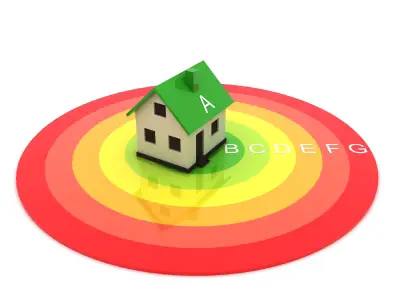Electric Energy Efficiency eBook preview
Do you feel that you can achieve better electrical efficiency and save money?
Would you like to save $100s every year on electricity by making your home more efficient?
Would you like to save $1000s every year on electricity by making your business more efficient?
Which efficiency methods will work out best?
How much will I save?
eBook Preview

- 60 Technologies reviewed
- 54 Best practices that can be applied for free
- 147 Reference links for further information
- Examples of efficiency savings from a few cents to $100,000s per year
- Commonly asked questions answered
- Solutions including what to do
- 31 tables included to help you calculate your energy savings
- 6 online calculators to work out your savings more precisely
- Full table of contents with section links and cross referencing to related topics
- Save Electricity
- Save Money
- Save Water
- Reduce Carbon Footprint
- Generate Electricity
- Even make money
By Matthew Bulat
M. Eng. Tech.
This e-book contains up to date information on the latest technologies that suit energy efficiency. Work out the costs and savings ahead of implementing your efficiency program. Learn how to measure the efficiency changes in real time to confirm predicted savings.
Preface
The concept behind this document is that it be used to source ideas on how to become energy efficient in the home and in your business. In this easy to use e-Book, you can access each chapter and section from the table of contents, or once in a section, follow the section reference links for more information. Additionally cross references for each section have been included. Follow the sections reference links for more information. Topics are in sections:
- Energy Efficiency Introduction
- Home Energy Efficiency
- Business Energy Efficiency
- Information Technology Performance Efficiency
- Alternative Energy Sources
- Efficient Transport Technology
- Energy Efficient Future Technologies
- Reference Links
To understand your own energy consumption, please read the chapter on measurement and if possible install a metering device. Take into consideration the local electrical wiring rules, electrical licensing requirements and local government rules before attempting new electrical projects. If you are unsure about any aspect of a new project then consult with local qualified experts in the field.
Copyright is held by Matthew Bulat.

Table Of Contents
| Energy Efficiency Introduction | |
| Measurement | |
| Home Energy Efficiency | |
| Free Home Best Practices | Hot Water |
| Pool Pumps | Air Conditioning |
| Refrigeration | Incandescent Lights vs Compact Fluorescent Lights |
| Halogen Lights vs LED Lights | Television Includes Possible Standby costs table per year |
| Dryer | Washing Machine |
| Stereo | DVD and Video player |
| Draft Stopper | Insulation |
| One Watt Standby | Linear vs. Switched Mode Power supplies |
| Power board with remote | |
| Business Energy Efficiency | |
| Free Best Work Practices | Fluorescent Lighting |
| Power Factor Correction | Air Conditioning |
| Alternative Cooling | Motion Controlled Lighting |
| Timers | Co-Generation |
| Information Technology Performance Efficiency | |
| Free Best Information Technology Practices | Laptop vs. Desktop |
| Thin Client vs. Desktop | Virtual Computing with Storage Area Network |
| 80 Plus Power Supplies | Energy Star 4 |
| VOIP | Video Conferencing |
| Network Attached Storage | New Low Power Processors |
| USB Power board | BIOS settings |
| Alternative Energy Sources | |
| Free Best Alternative Energy Practices | Solar Hot Water |
| Solar Power | Solar Security Lighting |
| Solar Night Lighting | Remote Solar |
| 12 Volt Lighting | Green Power Options |
| Micro Turbine Wind Energy | Large Turbine Wind Energy |
| Wave Energy | Solar Thermal Power |
| Concentrated Photo Voltaic | |
| Efficient Transport Technology | |
| Free Best Transport Practices | Public Transport |
| Bicycle | Electric Scooter |
| Electric Car | |
| Energy Efficient Future Technologies | |
| New Solar Cells | Geothermal Energy |
| Wave Energy | Electrical Storage |
| Solar Tower | |
| Reference Links |
Introduction
By being electrically efficient you will reduce the amount of power you use; reduce the need for electrically operated cooling or heating; and of course save money. With the cost of electricity likely to rise due to increasing resource costs, carbon trading and alternative energy requirements there is no time like the present to start saving. If enough people start saving electricity then new infrastructure costs in transmission distribution and extra power stations can be avoided. If national electricity consumption went down instead of up, this could lead to turning off the worst polluting power stations sooner. An auxiliary benefit of being electrically efficient is reduced CO2 emissions and water consumption at conventional coal and gas thermal power stations which is an added bonus for the environment. You should consider first becoming electrically efficient and then look at alternative energy sources as it is cheaper to implement electrical efficiencies. Audit what you have, measure your consumption and then work out a strategy. Start with the free best practices and then work out which others will give you a good return on your investment. The whole eBook is over 50 pages. This book is best used in an electronic format so that the hyperlinks and anchors work for you.
Thank you for your interest in Energy
Efficiency.
Testimonials
Very comprehensive
Very good
Instructions
Click on Section Headings to access the Energy Efficient eBook. Once at the eBook, section navigation is via the top menu.
Energy Efficiency eBook Table of Contents
For more information and access to calculators follow link Matthewb Homepage





